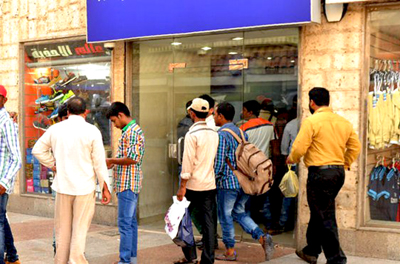Jeddah, Aug 23: Experts feel imposition of income tax on expatriates and linking their remittances to their income levels will boost Saudization and eliminate violations and irregularities in the labor market, including limiting run-away workers.
 Ahmed Al-Amoudi, former vice president at the Council of Saudi Chambers (CSC), said some workers violate regulations, but the income tax and fees on remittances will allow for more control and ensure that remittances are commensurate with the income. This will be done by requiring all foreign workers to open bank accounts for salary deposits.
Ahmed Al-Amoudi, former vice president at the Council of Saudi Chambers (CSC), said some workers violate regulations, but the income tax and fees on remittances will allow for more control and ensure that remittances are commensurate with the income. This will be done by requiring all foreign workers to open bank accounts for salary deposits.
Ali Al-Zahrani, member of the Al-Baha Chamber of Commerce and Industry, called on businessmen to do more to Saudize jobs by, for example, giving better salaries and allowances. He also said that foreign workers transfer millions of riyals, a large part of which is transferred illegally.
During his work as head of the Committee of Administrative and Workforce Development at the Al-Baha chamber, Al-Zahrani said the committee called for employing more Saudi youth and showing them patience until they become able to provide big returns to the private sector and national economy.
“The income tax will reduce the extensive remittances sent by foreign workers and generate revenues. This, in turn, will serve the nation and its youth by allowing for more growth,” he said.
According to Dr. Salem Bajaja, professor of economics, the imposition of an income tax on expatriates had been proposed before the Shoura Council in 1433, but was delayed. Now the decline in global oil prices made the issue resurface, in line with the initiatives of the Ministry of Finance and the National Transformation Program.
The initiative of making remittances commensurate with income levels is a step that will boost the transparency of financial operations specific to residents in the Kingdom, he said.
The Kingdom ranks second globally in terms of foreign remittances, after the United States.
Remittances have grown significantly over the past two decades, exceeding SR150 billion last year. This growth prompted the government to look into imposing an income tax on foreigners, a step that will not only boost revenues, but also help Saudization of jobs in the private sector.
Dr. Sami Al-Abidi of the Taif Chamber of Commerce and Industry believes the move aims to regulate demand for laborers in the Kingdom, and eventually replace them with locals. “In order to balance our economy and to avoid a gap between service providers and beneficiaries, more attention must be paid to enhancing the skills of Saudi workers and reexamining the output of colleges and training institutes,” he said.
“We must rebuild bridges of trust between employers and the Saudi workforce, as there has been a failure to reach business owners and explain to them properly the importance of having national cadres participate in the labor market, which enables money to circulate internally. We hope there will be more Saudization. Matching jobs is the responsibility of all, not only the private sector and the Ministry of Labor and Social Development,” he said.




Comments
Add new comment